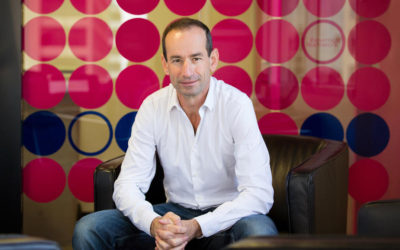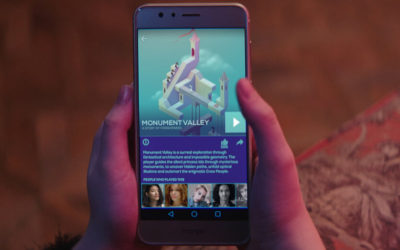Entrepreneurs: You May Just Find the Next Big Idea in Existing Ones
Entrepreneurs: You May Just Find the Next Big Idea in Existing Ones.
That’s the economy’s real hidden problem: the unseen (and therefore untapped) opportunity in existing ideas.
Many people don’t see that because they don’t enjoy the tough part of taking ideas all the way to the end.
Steel and I had a discussion about unseen opportunities, and he shared a view similar to mine about the nature of ideas: “To me, innovation isn’t really coming up with new ideas,” Steel explained.
Today the company has 4 million users and 75 employees.
First, he points out that a critical part of the journey was that he did not have a steadfast idea that GoGuardian needed to be a theft recovery tool simply because that’s how it started.
The challenge for leaders who want to operationalize this innovation mentality is that most people haven’t been trained to be able to identify those resting places – to see the opportunities, to anticipated the unexpected, and then have the entrepreneurial spirit to capitalize on those opportunities by reinventing.
That requires a generous purpose on the part of the leader because for an individual to define the business by, say, challenging the status quo, leaders must be willing to have their own status quo challenged.
A Leadership Identity that Enables Evolution Today Steel describes his role as “harnessing the potential of these incredible humans around me, and getting them to question their reality and be entrepreneurs in the context of GoGuardian.” In the same way that the world has a lot of “crevices”, Steel recognizes that GoGuardian has its own things that are a certain way for no good reason.
Steel sees it this way: “I see my job as helping my employees grow to reach their potential.
Jim Beach on startups and funding woes
Jim Beach on startups and funding woes.
0 Share Advertisement
replay
0.22/3.37 Auto Play Dim Auto
high medium low auto Switching Stream error “Sorry we could not play the video.
Click here to watch it now.”
Titan Company Ltd Aditya Birla Fashion & Retail Ashok Leyland Balkrishna Industries Power Finance Corporation Tech Mahindra Hindalco Industries ABB India Ltd Cipla Tata Communications Bharat Forge Rural Electrification Corporation Exide Industries GAIL (India)
Mahindra & Mahindra Castrol India Piramal Enterprises NLC India Tube Investments of India Federal Bank Kotak Mahindra Bank Glaxosmithkline Pharmaceuticals Infosys Eicher Motors Dabur India Bharat Heavy Electricals Bajaj Auto Bajaj Finance Mahindra & Mahindra Financial Yes Bank Idea Cellular Shriram City Union Finance Voltas Bharat Electronics Hindustan Unilever Reliance Capital Divis Laboratories GRUH Finance Larsen & Toubro Infotech Indian Hotels Company Biocon Reliance Power Central Bank of India MPhasis Larsen & Toubro Oil India HDFC Bank Asian Paints Alembic Pharmaceuticals Adani Ports & Special Economic Zone Rajesh Exports
Zee Entertainment
Page Industries ET Experts 1953 hrs ISTDuration: 04:46 Jim Beach on startups and funding woes 1458 hrs ISTDuration: 03:05 Low interest rate coupled with ticket size will spur buying: Hariprakash Pandey 0851 hrs ISTDuration: 04:13 Buy or Sell: Stock ideas by experts 1627 hrs ISTDuration: 01:42 Sensex tanks 104 pts, Nifty50 below 8,800 ahead of RBI rate call more market videos >>
4 Product Management Mistakes That Will Drive You Crazy
However, after startup life punched me in the face, I took a step back and realized the importance for me and every other founder to learn basic product management skills.
Today, I prioritize project management first, as that most directly affects deliverables — but most startup leaders still don’t understand the basic components of leading a product team.
Here are the most common project management mistakes that startups make: 1.
When your company is first getting started, it’s not uncommon for team members to “fall” into roles as is convenient, without any formal vetting process.
Next, make sure that it’s clear who to talk to about what.
If requirements or scope of projects frequently change, you can’t blame team members for not taking them seriously.
Half the battle in product management is communicating to your development team what the client wants in terms of product scope, not just the overall vision.
If you find that you frequently have to challenge clients who change requirements partly through the project development cycle, it may mean that your initial kickoff protocol is in need of improvement.
Similarly to changing requirements, consistently unrealistic timelines and deadlines will cause your teams to doubt whether those deadlines are actually important.
If you’re constantly pushing back deadlines, your team complains that they’re overly rushed or both, it may be time for a project management overhaul.
Seek, Hudson back Slingshot’s HR startup accelerator
Participating companies will receive a small cash injection of up to AU$50,000 in exchange for 10 percent equity, a larger stake than some other Australian accelerators such as Startmate, which provides AU$75,000 for 7.5 percent equity, and Telstra-backed Muru-D, which provides up to AU$60,000 in increments for 2 to 6 percent equity.
Like other accelerator programs, Human Capital’s participants will also receive mentorship, dedicated working space, and access to sponsorship partners’ business networks.
Meanwhile, Andrew Bassat, CEO of Seek, said the company itself was once a startup “born out of disruption” and has grown to become a AU$5 billion company.
The employment marketplace invested AU$200,000 into the accelerator program.
The University of Technology, Sydney (UTS) will be a “supporting partner” of Human Capital, bringing its talent and academic networks to the program.
An accelerator program will also take place this year where participating startups will receive up to $50,000 in funding from the Victorian government, Findex, the National Farmers Federation, and Artesian Ventures.
In addition, SproutX announced the launch of an agtech coworking space in Melbourne CBD.
Like Slingshot, RocketSpace also connects corporates with startups.
In January, Boulder, Colorado-headquartered startup accelerator Techstars announced that it would be launching a program in Adelaide, South Australia.
Similar to its accelerators in the US and UK, Techstars Adelaide will be a three-month mentorship-driven program with 10 participating startups receiving up to $120,000 each in exchange for 6 to 9 percent equity, which can be bought back by the startups should they want to by returning the investment.
The Donald Trump of IPOs
The Donald Trump of IPOs.
Snapchat has given us the first blockbuster initial public offering of the Trump era.
And it’s the most Trumpian qualities of Snapchat and its IPO that make them fascinating.
The Snapchat prospectus is undoubtedly the first in history to contain the words sexting and poop.
As the prospectus notes: “When we were just getting started, many people didn’t understand what Snapchat was and said it was just for sexting, even when we knew it was being used for so much more.” (More coincidentally than anything else, Spiegel also happens have found a foreign supermodel as a life partner, just like Trump.)
Public companies run on the notion that managers are agents for the people who actually own the economic interest in the company, just as voters historically presume the people they elect president will work for them and not retain ties to, say, their own businesses.
Speaking to the Financial Times, Anne Simpson, the head of corporate governance at pension fund giant CalPERS, characterized Snap’s corporate governance as a “a banana republic-style approach.” It’s as if the company’s leaders view people’s election to participate in the IPO as the only moment of accountability.
The company’s net loss for the year was $514 million.
But Snap’s revenue growth is already showing signs of leveling off.
Between the second and third quarters, revenue grew 77 percent.
Crack the code
2: A city’s top companies and business leaders come together to form an investment vehicle for startups that attracts out-of-state investment.
“The idea was to create a fund of funds; a fund to invest in great venture funds around the country, with the idea that you could leverage a limited amount of money into a larger impact,” Rizik said.
Renaissance raised $45 million for its first fund in 2008, and invested it all in outside venture capital funds.
Rizik estimated that for every dollar the Renaissance Fund invested in that first round, it attracted $23 of investment to Michigan from out of state.
From 2008 to 2011, Michigan saw 114 deals for $615 million.
Roughly half of that money, between $1 million and $1.2 million, was distributed to startups in the form of $50,000 grants.
The state had only 103 VC-backed deals from 2000 to 2007, for $888.3 million.
I can’t name three venture-backed (startups) here.
That’s more than any startup here.
Forming a cohesive startup community and attracting significant venture capital investment, however, is still a work in progress.
Rovio spin-out Hatch lines up 90 mobile games for social hub
Rovio spin-out Hatch lines up 90 mobile games for social hub.
Hatch has signed up more than 90 games from 50 studios to debut this year on its social hub that can stream mobile games instantly to gamers.
Other confirmed games include Monument Valley, Leo’s Fortune, Pac-Man, Space Invaders, and Rayman.
Rovio spun out Hatch in November as a new kind of social hub for mobile titles.
That service will allow consumers to play and share full-featured games over the cloud, and it will offer developers a new way to reach mass audiences on mobile for premium titles.
A friend could watch you play — or even take over the game and play while you become a spectator.
Hatch offers an instant game collection, carefully curated to provide the highest quality gaming experiences.
Games on Hatch live in the cloud, so playing is instant — with no downloads, updates, or in-app purchases.
“From our partner developers, above all we are looking for full-featured games that are fun to play,” said Honkala in a statement.
Now it has spun out, and it has a vision to change the way people play games.
Lenovo introduces $299 Yoga A12 convertible Android tablet with Halo keyboard
Lenovo introduces $299 Yoga A12 convertible Android tablet with Halo keyboard.
Lenovo today is introducing the Yoga A12 convertible tablet, a variation on its $499 Yoga Book with a larger display, stripped down specs, and a rose gold color option, alongside the more typical gunmetal gray.
The device will be available on February 8 through Lenovo’s website, starting at $299.
Whereas the Yoga Book was available with full Windows 10 or Android, the Yoga A12 is only available with Android.
The tablet features an Intel Atom x5 chip, 2GB of RAM, 32GB of storage, two Dolby Atmos speakers, and up to 13 hours of battery life, according to a statement.
The Yoga Book, for the sake of comparison, comes with 4GB of RAM, 64GB of storage, and up to 15.5 hours of battery life.
The original Yoga Book’s display measures 10.1 inches and does indeed feel a bit cramped when used in laptop mode, so the Yoga A12, with its 12.2-inch touch-friendly HD display, should feel more accommodating.
The new device weighs less than 2.2lbs (1kg) and opens to 5.4mm at its thinnest point, according to the statement.
Perhaps the biggest question worth thinking about at this point is whether you prefer Chrome OS or Android itself if you’re in the mood to use Android apps on a tablet with a keyboard.
While you think about that, Lenovo is going ahead and providing options for you to choose from, either way.
Valve updates Destinations social VR with quests and trading
Valve updates Destinations social VR with quests and trading.
First launched as a set of tools for creating locations others could visit in VR, Destinations got multiplayer in July amid a steady stream of updates.
From a blog post about the update: Travel to various Destinations to find hidden item caches using the new Cache Finder tool.
Locate one, and you (along with anyone questing with you) will earn a wearable item or avatar head to customize the way you look.
Fancy a different hat than the one you found?
Trade with other Destinations players on Steam or head over to the Steam Market.
In other words, first Destinations gave you places to visit in virtual reality and the tools to make your own places.
Then they added multiplayer so you could visit these places with other people.
The update also includes a variety of props and tools you can use, including a sketching tool and a drone you control by remote.
We haven’t tried it yet, but Destinations is looking a lot like Oculus Toybox.
Kimbell Royalty IPO To Begin Trade Friday After Pricing At $18 a Share
Kimbell Royalty IPO To Begin Trade Friday After Pricing At $18 a Share.
Kimbell Royalty Partners L.P. said it priced its initial public offering of 5 million shares at $18 a share, to raise $90 million.
The new shares will begin trading Friday on the New York Stock Exchange under the ticker symbol “KRP.”
The Texas-based oil and gas mineral master limited partnership said it has granted the underwriters of the IPO a 30-day option to buy up to an additional 750,000 shares.
Raymond James is the lead book-running manager, and RBC Capital Markets and Stifel are joint book-running managers.
Copyright © 2017 MarketWatch, Inc.
Weiss Tech House relaunches fund to develop student startups
Weiss Tech House relaunches fund to develop student startups.
Last Friday, students at the Weiss Tech House held an event to relaunch the Innovation Fund, reaffirming the organization’s commitment to helping student entrepreneurs create successful companies.
Founded in 2003, the Weiss Tech House Innovation Fund is a mini venture capital fund that helps develop student-founded startup companies.
Students outline their product and business models to the committee that runs the fund, and if their visions are compelling, they can receive between $500 and $2,000 to grow their ideas.
Wharton graduate student Naif Alhujilan came to the relaunch event to learn more about how he could take advantage of the Innovation Fund to further his business ideas.
The fund has facilitated the development of a diverse range of companies.
In the past five years, the fund has helped companies started by students from many of Penn’s undergraduate and graduate schools, and one-third of these companies include female entrepreneurs.
The fund does not take any ownership in these companies, meaning that students retain full control over their ideas.
However, the fund previously dealt with frequent leadership changes and organizational issues that limited its ability to help its clients.
“We wanted to share what we were learning with the students seeking guidance”
India: Helion co-founder Ashish Gupta joins startup HyperTrack’s board
India: Helion co-founder Ashish Gupta joins startup HyperTrack’s board.
Helion Ventures co-founder Ashish Gupta has joined the board of HyperTrack, which has recently closed a $1.5 million seed round of funding from investors including Gupta, Vy Capital, Jubiliant Group co-founder Hari Bhartia and the Junglee.com founders, the company said on Monday.
HyperTrack helps businesses track products or people in real time.
Co-founded by Kashyap Deorah and Tapan Pandita, HyperTrack is already working with more than 100 firms across 30 plus countries.
“I am glad to be adding my pin to the Hypertrack destination… Given that mobile computing has become a fact of life, most applications need location oriented functionality—location is merely mobility-at-one-point-in-time.
“HyperTrack will continue providing increasingly richer building blocks that leverage location (value-added-location as a service).
Co-founded by Deorah and Tapan Pandita, HyperTrack is already working with more than 100 firms across 30 plus countries.
Deorah and Pandita pooled in $300,000 to launch the venture with a vision to creating a global technology firm from India.
The list of clients includes on-demand logistics company OkHi in Kenya, ride-sharing company Carpool Arabia in Dubai, Mumbai-based healthcare services start-up Care24 and online education start-up Toppr.
He served Future Bazaar as president for over two years.
New Lansing seed capital fund to invest in startups
New Lansing seed capital fund to invest in startups.
Courtesy Photo LANSING — A group of Lansing-area investors wants to provide seed capital to one new company annually that’s just getting off the ground.
They’re now scouting for a startup company that can use seed funding of $20,000 to $30,000 to get started on commercializing an innovation.
Altruis Capital will seek investment prospects from across the state with a focus on the Lansing area, said Tom Stewart, a founding member and managing partner at Common Wealth Enterprises LLC in Lansing.
Partners in the fund don’t have enough to invest individually or to become involved in an angel investment group, so they opted to pool their money in Altruis to support entrepreneurism, Stewart said.
He cites a need where startups may secure some funding through a local business plan competition, then “falter a little bit, mostly because they could use a little bit of capital and a little push.” “There is a group of us who are kind of making this stuff happen in our region, so we got together and decided to pull the trigger,” Stewart said.
Partners in Altruis include attorneys, accountants and other service professionals who can mentor and assist entrepreneurs.
“We can also tie our network into making this business successful,” Stewart said.
“We are essentially creating a farm league,” Stewart said.
“We want to a create a place where more mature VC firms can come and take a look and say, ‘Tell me what you have in your portfolio.’ So we’re creating deal flow for everybody eventually, hopefully.” 5×5 Night
Brain Computer Interfaces – 10 Startups to Watch
It’s only a matter of time before we’re able to control things with our minds using brain computer interfaces, even communicate to each other just using our minds.
Just recently we gave you a glimpse of brain interface technology that’s going to redefine our concept of a user interface with AR/VR, enable us with neuroprosthesis, and apparently allow us to control all our social media relationships with our minds.
The Company has taken in two rounds of funding totaling $108.5 million so far.
Kernel Co. We’ve mention Kernel Co before in one of our posts related to AI and brain implants and even dedicated an entire article to this amazing company which has taken in $100 million in funding from technology pioneer Bryan Johnson who is investing in moonshot ideas like chips for your brain and space mining.
Cerêve offers a technology addressing the root cause of sleep disorders which is our mind’s hyperarousal during sleep.
The US Food and Drug Administration (FDA) granted commercial clearance for Cerêve(™) Sleep System as a prescription device.
Founded in 2007, InteraXon has taken in a total of $17.2 million in funding so far from investors that include Ashton Kutcher.
BrainCo’s offering includes an integrated classroom system that uses their wearables or headbands to see what’s happening inside a student’s brain while in class.
The prosthetic limbs motor function is driven by electroencephalography (EEG) which means the limbs are controlled by the same myoelectric signals sent by the brain to the muscles.
NeuroLutions Founded in 2007, Missouri based NeuroLutions has taken in a total of $2.15 million in funding to develop a revolutionary platform using Brain Computer Interface (BCI) technology to restore functions to paralyzed limbs.
Momentum to organize its maiden conference for startups and investors in Karachi
Momentum to organize its maiden conference for startups and investors in Karachi.
The two-day event is attracting investors, tech leaders, business executives, and academia who will share their stories and highlight the latest trends that will shape the future of business in Pakistan.
In addition to keynote speakers sharing their inspirational stories, there is also a pitching event.
Mentors will select 20 startups that will pitch their ideas to the jury and audience.
It extends internet connectivity beyond laptops, desktops and smartphones to a diverse range of devices with embedded technology to communicate, e.g security systems, thermostats, cars etc.
Momentum Conference will be a junction where ideas will meet investment.
Momentum will provide a platform to the budding startups and incubators to get funding from investors by pitching their ideas.
The discussions with keynote speakers will lead to innovative ideas generation.
In addition to the funding, startups will also get mentorship, training and guidance from investors, industry experts and tech leaders.
Below is the schedule of the conference.
The Best Days to Send Email Campaigns and Other Email Marketing Tips
The Best Days to Send Email Campaigns and Other Email Marketing Tips.
The “best time” to send emails depends on your unique product/service, customer base and content, but there are some general best practices email marketers can use to optimize when their campaigns arrive in inboxes.
With the exception of campaigns promoting hobby and recreational content, its data indicates that weekends are the least ideal time to send an email marketing campaign.
The type of content your email marketing campaign promotes dictates the time of day it arrives in your inbox, too.
Hobby-related content email marketing responses are optimized when messages are delivered between 6 a.m. and 8 a.m.; retail-related email content is most impactful when it arrives in inboxes between 8 a.m. and 9 a.m.
Both data points suggest that B2C content may most likely be read when it’s in the recipient’s inbox before the traditional work day begins.
Spend time crafting the perfect subject line.
Some experts recommend subject lines that lead with actionable language (using words such as “save,” “learn,” “take” and “see”).
While it takes time and strategy to segment and manage a targeted email marketing list, it’s worth the investment.
According to one study, the majority of respondents said most of their email marketing campaigns are intended to drive either revenue or customer engagement, and that segmented and targeted email campaigns generate nearly 60 percent of their email marketing-related revenue.
Why Intel is filling the skies with drones
The other was a drone with six RealSense cameras.
When it came to drones, we started with the RealSense technology.
Then you have the processing behind it, applying tools and software that need a lot more compute.
Image Credit: Intel VB: How do you start addressing the notion that this generates too much data?
Drones are getting better and better.
To create that automation, the systems need to get smarter.
Since then, we’ve seen a lot of interest in how this can be applied for all kinds of shows.
The other was a drone with six RealSense cameras.
When it came to drones, we started with the RealSense technology.
Then you have the processing behind it, applying tools and software that need a lot more compute.
Secrets From a Super Bowl Campaign That’s Had 2 Billion Impressions
Secrets From a Super Bowl Campaign That’s Had 2 Billion Impressions.
That’s is what Avocados From Mexico (AFM), in its third year entering the Super Bowl advertising space, just accomplished.
Last year, the brand’s Super Bowl campaign garnered more than 133,000 social mentions and at least 828,000,000 impressions.
According to Simply Measured, AFM’s digital campaign has already delivered more than two billion impressions.
Keeping focused on their KPIs helps keep Kinser and her team manage the creative and the design that goes into every aspect of the digital activation.
“Absolutely everything we do within our Super Bowl campaign, from our media plan buy to our UX (user experience), interactive design, and even down to a single tweet, has the purpose to drive users to watch the spot, or to participate in our conversation.” 2.
The result is a single hub with 16 user engagement experiences under the #AvoSecrets umbrella.
This influencer marketing strategy helped the brand achieve over 1B organize social impressions just half way through the campaign, and days before the big game.
Even if you don’t have a big budget, you can leverage the humanizing power of influencer marketing to expand your reach.
Doing this, and focusing on a user experience where people engage on their terms, while staying focused on specific goals are three keys to success in any digital campaign.


















